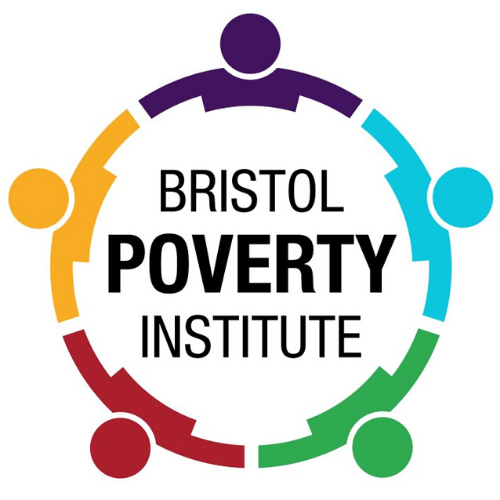Bristol Poverty Institute is one of the University of Bristol’s Specialist Research Institutes, created to develop interdisciplinary approaches to better understanding – and ultimately tackling – the multiple dimensions of poverty. Elizabeth Blackwell Institute, one of five University Research Institutes, holds a focus on interdisciplinary research in health across all University Faculties and external stakeholders and partners, including a current research initiative supporting Mental Health in Young People.
This joint Mental Health and Poverty interdisciplinary seminar looked at the range of ways mental health can intersect with poverty, including but not limited to socioeconomic inequalities, life course trajectories, different dimensions of vulnerability, suicide, social welfare, law and policy, and health and wellbeing. Participants from different disciplines and not currently working directly on poverty-focussed projects were particularly welcomed, as a key purpose of these seminars is to bring together researchers working in relevant fields and to try and expand the community of University of Bristol researchers engaged with poverty-relevant issues.
Co-Chairs, Nina Couzin, Elizabeth Blackwell Institute Manager, and Lauren Winch, Bristol Poverty Institute Manager introduced four fantastic speakers who gave five-minute presentations on different approaches and perspectives on mental health and poverty. This gave food for thought to fuel the lively, open discussion which followed. Everyone was encouraged to participate and reflect on the ways in which their research could contribute to the intersecting themes of mental health and poverty.
Poverty in low- and middle-income countries
Dee Knipe, Vice Chancellor’s Fellow in Population Health Sciences at Bristol Medical School spoke first. Dee is a mental health epidemiologist with an interest in life course risk factors for suicide and self-harm. Her work has explored the social determinants of mental ill health and has looked at the impact of national policies in reducing suicide deaths. Her work has primarily been in low- and middle-income countries, with a particular focus on how social factors impact the suicide/self-harm risk in Sri Lanka. She explained how migration is poverty-driven as there are no local employment alternatives and, as a result, children are left behind in difficult circumstances. Whilst the government has taken a step back from its policy banning migration in light of Human Rights regulations, she says the problems still remain. Dee’s further interests lay therefore in how healthy migration could be supported. Find out more about Dee Knipe’s research.
Poverty and debt
Jamie Evans, a Senior Research Associate in the School of Geographical Sciences and quantitative social researcher at the Personal Finance Research Centre next gave an overview of his research which examines the interrelationship between debt, financial difficulty and mental health, and how banks and debt charities are tackling these issues. He explained how individuals delay seeking help, with reasons including the stigma associated with it, the fear of potential consequences, and/or not knowing what talking to a bank or charity looks like. He noted that it is therefore it is important to discuss the reality and make people aware of what is being done in order that they seek help. This is vitally important, as those who delay seeking help are 8.5 more times likely to experience mental health issues and more likely to take their own life. Find out more about Jamie Evans’ research.
Homelessness and autism
Beth Stone, PhD Researcher in the School for Policy Studies spoke next, explaining her research focus around the lived experience of homeless adults with an autistic spectrum disorder. She is particularly interested in the life trajectory of autism, the difficulties surrounding diagnosis in adulthood, and the socio-economic disadvantages associated with being ‘on the spectrum’. Find out more about Beth Stone’s research.
Poverty and neurodevelopmental conditions
Next, Dr Tim Cadman, Senior Research Associate in Population Health Sciences introduced his research which explores attachment and the intergenerational transmission of mental health problems, and functioning and co-morbidity in neurodevelopmental conditions. He is a trained Clinical Psychologist and has worked in the NHS, primarily with children and families. His interest in neurodevelopmental conditions is to understand the high levels of comorbidity and develop interventions at both the individual and policy level. Tim is very open to linking up with other researchers to maximise the value of the available data. Those who are interested can find out more about the datasets via the following links:
Law, policy and human rights
Lauren gave an overview of Professor of Law, Judy Lang’s research as she was unable to attend the event. Lauren provided a brief overview of Judy’s background and research interests in mental health law, policy and human rights, including her role as a Mental Health Act Expert for the Society of Legal Scholars Advisory Group. Judy wrote an article last year with her colleague John Coggon in the law school on mental health, persons, populations and parity of esteem, which explains this issue in more depth, and which may be of interest to workshop participants. Access ‘Reviewing the boundaries of health law – new directions and dimensions’ article.
Following these interesting and thought-provoking presentations the floor opened up to questions, comments, reflections or insights. Attendees explored a range of topics including:
- Homelessness and Gender
- Mental Health and Finance
- The complex relationship between mental health and poverty, and difficulties identifying cause and effect
- The difficulty of recruiting and accurately representing homeless people in research studies, and potential ways of overcoming this and/or suitable proxies such as those in temporary housing
- Adolescent poverty and hunger
- Data linkage opportunities
- The interrelationships between Learning Disabilities and Mental Health
The Elizabeth Blackwell Institute and Bristol Poverty Institute welcomed suggestions on how they could support further development of collaborations in this space. If you have any suggestions, or would like to find out about support available for researcher-led activities, please get in touch with bristol-poverty-institute@bristol.ac.uk and/or ebihadmin@bristol.ac.uk.

